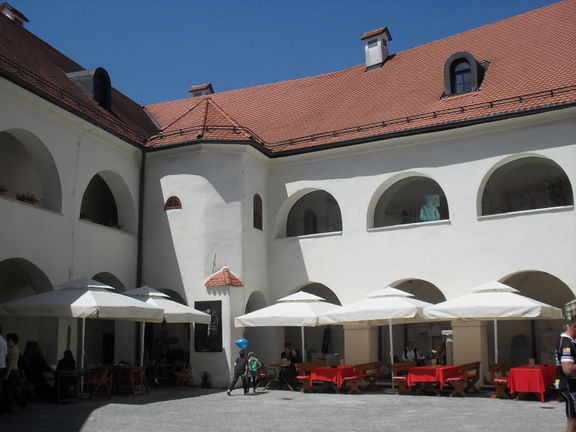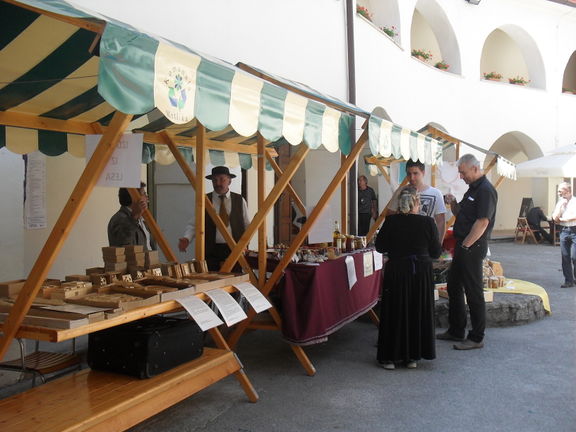Difference between revisions of "Bela krajina Museum, Metlika"
Anže Zorman (talk | contribs) (Changed and upgraded(by request)) |
|||
| Line 33: | Line 33: | ||
{{Teaser| | {{Teaser| | ||
| + | Founded in [[established::1951]], the [[Bela krajina Museum, Metlika|Bela krajina Museum]] is based in the Metlika castle, situated in the old part of this picturesque [[Municipality of Metlika|town]] near the Kolpa River, the natural border between Slovenia and Croatia. The museum houses and presents the movable cultural heritage of Bela krajina. The museum manages three satellites – [[Kambič Gallery]] in Metlika, [[Oton Župančič Memorial House]] in Vinica and the [[Semič Local Museum Collection]]. | ||
| + | }} | ||
| − | {{ | + | {{YouTube|ZVeka9TzN_0}} |
| − | + | == History == | |
| − | |||
| − | + | Although there was a wish to have a museum in Bela krajina from 1910 onward, the foundations were laid only in 1949, when the Metlika Museum Society was founded. Two years later the museum was officially established with premises in the Metlika castle and town hall. In the next 30 years it developed into a significant cultural institution with an extensive permanent exhibition, rich archives, full depositories and library, under the leadership of [[Jože Dular]]. | |
| − | Although there was a wish to have a museum in Bela krajina from 1910 | ||
| − | In 1981, when [[Zvonko Rus]] became the head of the museum, the Gangl Exhibition Gallery was opened in the castle for temporary exhibitions. After the great restoration work on Metlika castle in 1999–2000 the Bela krajina Museum opened with a newly arranged permanent exhibition, expanded its dislocated venues, and increased the number of visitors. | + | In 1981, when [[Zvonko Rus]] became the head of the museum, the Gangl Exhibition Gallery was opened in the castle for temporary exhibitions. After the great restoration work on Metlika castle in 1999–2000 the Bela krajina Museum opened with a newly arranged permanent exhibition, expanded its dislocated venues (of them, the [[Črnomelj Municipal Museum]] later got independent), and increased the number of visitors. |
== Metlika castle == | == Metlika castle == | ||
| + | |||
The Metlika castle, first mentioned in 1456, but probably far older, played a key role in defending Carniola from the Turkish raids mainly in the 15th and 16th centuries. In the 16th century, it was owned first by the Alapi counts, then the Frankopans (a Croatian noble family), and subsequently by the Zagreb Cathedral Chapter. After the fires in 1705 and 1790, the restoration work was carried out and the castle building acquired the look of a comfortable town residence. | The Metlika castle, first mentioned in 1456, but probably far older, played a key role in defending Carniola from the Turkish raids mainly in the 15th and 16th centuries. In the 16th century, it was owned first by the Alapi counts, then the Frankopans (a Croatian noble family), and subsequently by the Zagreb Cathedral Chapter. After the fires in 1705 and 1790, the restoration work was carried out and the castle building acquired the look of a comfortable town residence. | ||
| Line 50: | Line 51: | ||
== Collections on display== | == Collections on display== | ||
| − | |||
| − | The | + | The cultural history collection at Metlika presents the history of Bela krajina from 1200 onward, from the time the Kolpa became the border river between Carniola and Croatia. One interesting, though dark, period is that of the Turkish incursions in the 15th and 16th centuries. The lapidary collection, established in 1998, contains 19 fascinating objects relating to Roman, medieval and modern history. The ethnological collection illustrates the way of life in the 19th and early 20th centuries, when Črnomelj and Metlika were major centres of crafts and trade. There is also a special viticulture collection in the castle cellar from 1991 on. A thematic permanent exhibition is dedicated to the radio receivers owned by [[Anton Stipanič]], one of the founders of an amateur radio organisation who won the [[Valvasor Award|Valvasor Honorary Recognition]] in 2007 for its donation to the museum. |
| − | On the ground floor of Metlika castle, museum visitors can visit the Grajska Klet winery, where they can taste the excellent wines of Bela krajina. | + | The museum also houses a rich collection of visual arts, emphasising work by artists from the Bela krajina region. Bela krajina Museum's exhibitions conclude with the collection of recent history that introduces the visitor to the major events in Bela krajina in the first half of the 20th century. The museum also holds regular temporary exhibition, changes approximately once per year and spanning the topics of |
| + | |||
| + | On the ground floor of Metlika castle, museum visitors can visit the Grajska Klet winery, where they can taste the excellent wines of Bela krajina. | ||
== See also == | == See also == | ||
| + | |||
* [[Kambič Gallery]] | * [[Kambič Gallery]] | ||
| − | * [[Oton Župančič Memorial | + | * [[Oton Župančič Memorial House]] |
* [[Semič Local Museum Collection]] | * [[Semič Local Museum Collection]] | ||
* [[Črnomelj Municipal Museum]] | * [[Črnomelj Municipal Museum]] | ||
| Line 65: | Line 68: | ||
== External links == | == External links == | ||
| − | * [http://www.belokranjski-muzej.si/ Bela krajina Museum, Metlika website] | + | * [http://www.belokranjski-muzej.si/default_en.asp Bela krajina Museum, Metlika website] |
* [http://portfolio-now.com/LUMINUS_FLIPBOOK/belokranjski_muzej/Turki_Uskoki/index.html ''1408 / First came the Turks, then the Uskoks''], e-book (with summaries in English) | * [http://portfolio-now.com/LUMINUS_FLIPBOOK/belokranjski_muzej/Turki_Uskoki/index.html ''1408 / First came the Turks, then the Uskoks''], e-book (with summaries in English) | ||
Revision as of 11:08, 6 September 2016
History
Although there was a wish to have a museum in Bela krajina from 1910 onward, the foundations were laid only in 1949, when the Metlika Museum Society was founded. Two years later the museum was officially established with premises in the Metlika castle and town hall. In the next 30 years it developed into a significant cultural institution with an extensive permanent exhibition, rich archives, full depositories and library, under the leadership of Jože Dular.
In 1981, when Zvonko Rus became the head of the museum, the Gangl Exhibition Gallery was opened in the castle for temporary exhibitions. After the great restoration work on Metlika castle in 1999–2000 the Bela krajina Museum opened with a newly arranged permanent exhibition, expanded its dislocated venues (of them, the Črnomelj Municipal Museum later got independent), and increased the number of visitors.
Metlika castle
The Metlika castle, first mentioned in 1456, but probably far older, played a key role in defending Carniola from the Turkish raids mainly in the 15th and 16th centuries. In the 16th century, it was owned first by the Alapi counts, then the Frankopans (a Croatian noble family), and subsequently by the Zagreb Cathedral Chapter. After the fires in 1705 and 1790, the restoration work was carried out and the castle building acquired the look of a comfortable town residence.
Today the castle is a several-storey complex with a pentagonal ground plan, entered through a three-story entrance tower that opens into a spacious arcaded inner courtyard. It houses the Bela krajina Museum with a permanent exhibition and Gangl Exhibition Gallery, a wedding hall and wine cellar, and the nearby collection of the Slovene Fire Fighters Museum of Branko Božič. In summer it hosts many cultural events: the Castle Evenings programme, and the Gangl Gallery is one of the venues for "Wine Spring" (Vinska vigred) festivities. The castle underwent major restoration works in 1999–2000, including a replacement of the roof construction and roofing, ceilings, windows, and doors.
Collections on display
The cultural history collection at Metlika presents the history of Bela krajina from 1200 onward, from the time the Kolpa became the border river between Carniola and Croatia. One interesting, though dark, period is that of the Turkish incursions in the 15th and 16th centuries. The lapidary collection, established in 1998, contains 19 fascinating objects relating to Roman, medieval and modern history. The ethnological collection illustrates the way of life in the 19th and early 20th centuries, when Črnomelj and Metlika were major centres of crafts and trade. There is also a special viticulture collection in the castle cellar from 1991 on. A thematic permanent exhibition is dedicated to the radio receivers owned by Anton Stipanič, one of the founders of an amateur radio organisation who won the Valvasor Honorary Recognition in 2007 for its donation to the museum.
The museum also houses a rich collection of visual arts, emphasising work by artists from the Bela krajina region. Bela krajina Museum's exhibitions conclude with the collection of recent history that introduces the visitor to the major events in Bela krajina in the first half of the 20th century. The museum also holds regular temporary exhibition, changes approximately once per year and spanning the topics of
On the ground floor of Metlika castle, museum visitors can visit the Grajska Klet winery, where they can taste the excellent wines of Bela krajina.
See also
- Kambič Gallery
- Oton Župančič Memorial House
- Semič Local Museum Collection
- Črnomelj Municipal Museum
- Slovene Fire Fighters Museum, Metlika
- Municipality of Metlika
External links
- Bela krajina Museum, Metlika website
- 1408 / First came the Turks, then the Uskoks, e-book (with summaries in English)




